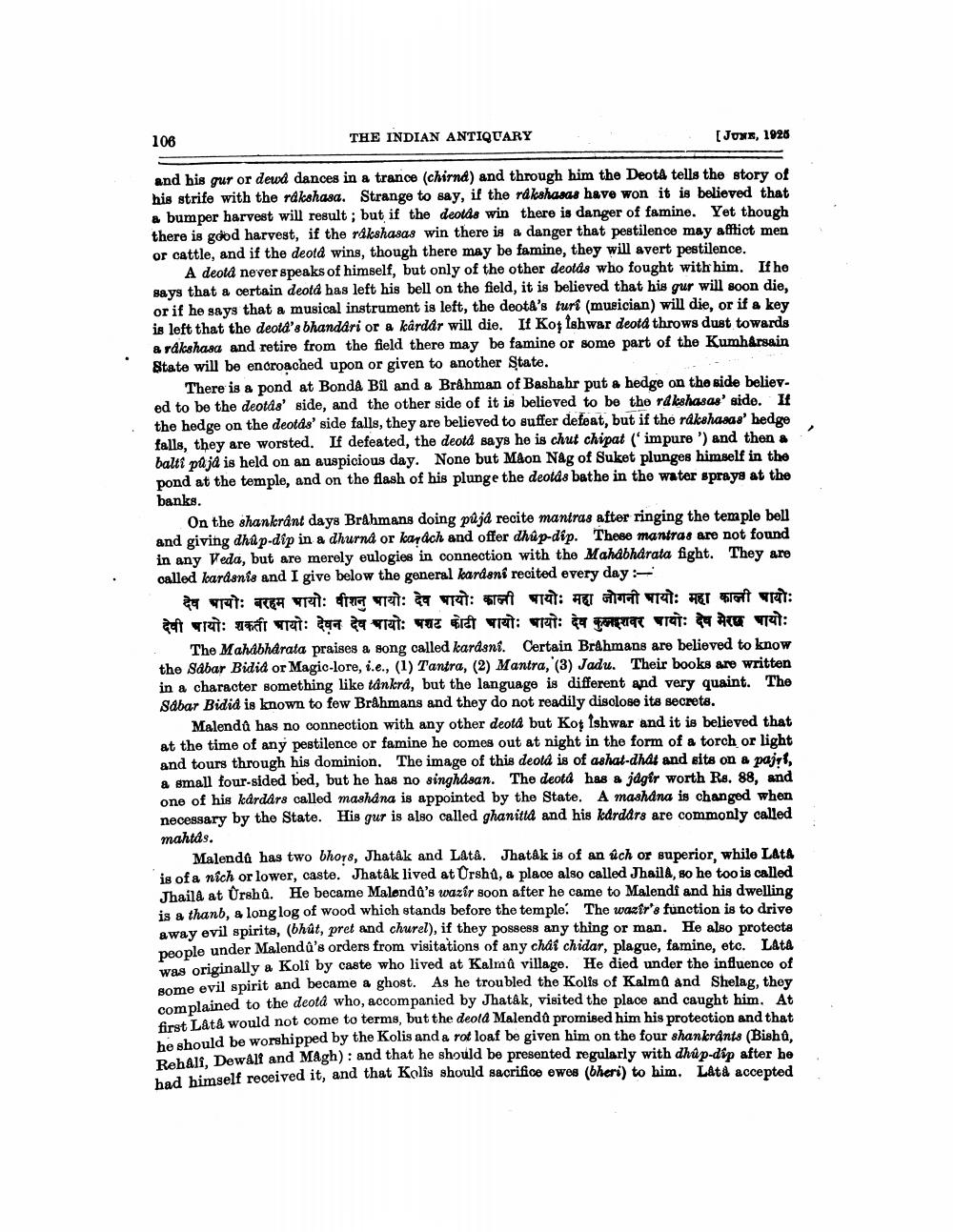________________
106
THE INDIAN ANTIQUARY
[Jux, 1928
and his gur or deud dances in a trance (chirnd) and through him the Deota tells the story of his strife with the rakshasa. Strange to say, if the rakshasas have won it is believed that a bumper harvest will result; but if the deatas win there is danger of famine. Yet though there is good harvest, if the rakshasas win there is a danger that pestilence may affitict men or cattle, and if the deotd wins, though there may be famine, they will avert pestilence.
A deota never speaks of himself, but only of the other deoids who fought with him. If ho says that a certain deotá has left his bell on the field, it is believed that his gur will soon die, or if he says that a musical instrument is left, the deota's turi (musician) will die, or if a key is left that the deotd's bhandari or a kardar will die. If Kot Ishwar deota throws dust towards a rakshasa and retire from the field there may be famine or some part of the Kumharsain State will be enoroached upon or given to another State.
There is a pond at Bonda Bil and a Brahman of Bashabr put a hedge on the side believed to be the deotas' side, and the other side of it is believed to be the rakshasas' side. It the hedge on the deotds' side falls, they are believed to suffer defeat, but if the rakshasas' hedge falls, they are worsted. If defeated, the deota says he is chut chipat ('impure ') and then a balti půjd is held on an auspicious day. None but Maon Nag of Suket plunges himself in the pond at the temple, and on the flash of his plunge the deotás bathe in the water sprays at the banks.
On the shankrant days Brahmans doing půjd recite mantras after ringing the temple bell and giving dhup-dip in a dhurnd or karach and offer dhů p-dip. These mantras are not found in any Veda, but are merely eulogies in connection with the Mahabharata fight. They are oalled kardanís and I give below the general kardani recited every day
देव पायोः बरहम पायोः वीशनु पायोः देव पायोः काली पायोः महा जोगनी पायोः महा काली पायोः देवी पायोः शकती पायोः देवन देव पायोः पशट कोटी पायोः पायोः देव कुलइशवर पायोः देष मेरछ पायोः
The Mahabharata praises a song called kardani. Certain Brahmans are believed to know the Sabar Bidid or Magic-lore, i.e., (1) Tantra, (2) Mantra, (3) Jadu. Their books are written in a character something like tankrd, but the language is different and very quaint. The Sabar Bidid is known to few Brahmans and they do not readily disclose its secrets.
Malenda has no connection with any other deotd but Kot Ishwar and it is believed that at the time of any pestilence or famine he comes out at night in the form of a torch or light and tours through his dominion. The image of this deotd is of ashat-dhat and sits on a pajrf, a small four-sided bed, but he has no singhdsan. The deota has a jdger worth Rs. 88, and one of his kárdárs called mashana is appointed by the State. A mashana is changed when necessary by the State. His gur is also called ghanitta and his kdrdars are commonly called mahtås.
Malenda has two bhors, Jhatak and Latå. Jhatak is of an uch or superior, while Lata is of a nich or lower, caste. Jhatak lived at Urshu, a place also called JhailA, so ho too is called Jhaila at Urshû. He became Malonda's wazîr soon after he came to Malendi and his dwelling is a thanb, a long log of wood which stands before the temple. The wazir's function is to drive away evil spirita, (bhût, pret and churel), if they possess any thing or man. He also protects people under Malenda's orders from visitations of any chái chidar, plague, famine, etc. Lata was originally a Koli by caste who lived at Kalma village. He died under the influence of some evil spirit and became a ghost. As he troubled the Kolis of Kalma and Shelag, they complained to the deota who, accompanied by Jhatak, visited the place and caught him. At first. Lat& would not come to terms, but the deota Malendů promised him his protection and that he should be worshipped by the Kolis and a rot loaf be given him on the four shankrants (Bish.
hat Dewalt and Magh): and that he should be presented regularly with dhup-dip after be hed himself received it, and that Kolis should sacrifice ewes (bheri) to him. Lata accepted




